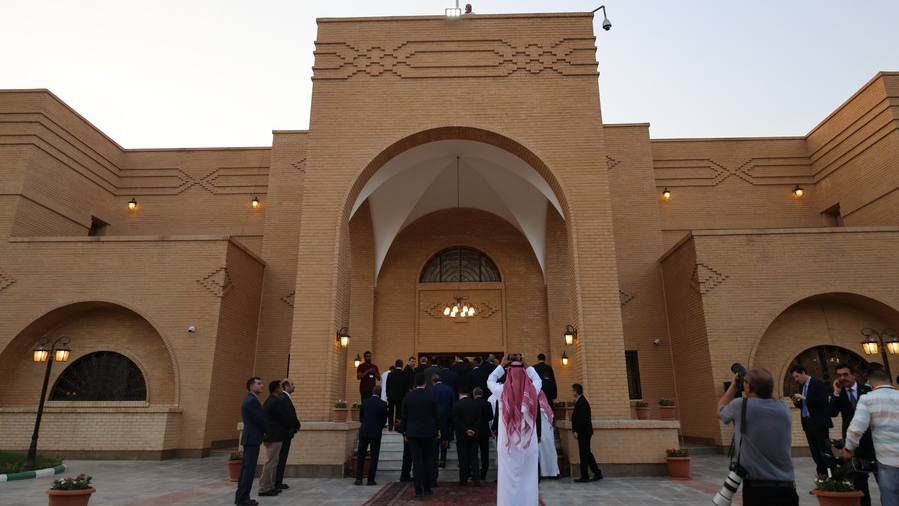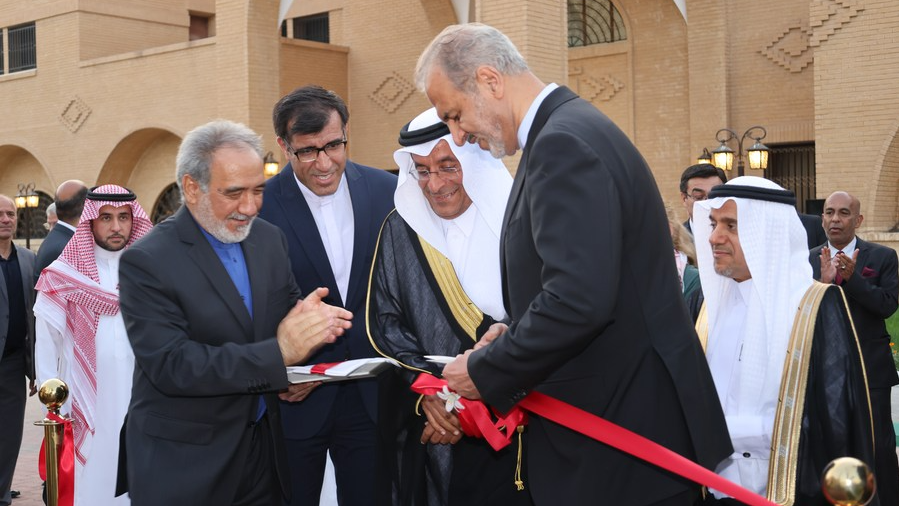
The reopened Iranian embassy in Riyadh, Saudi Arabia, June 6, 2023. /Xinhua
The reopened Iranian embassy in Riyadh, Saudi Arabia, June 6, 2023. /Xinhua
Editor's note: Steven Sahiounie, a special commentator on current affairs for CGTN, is the Chief Editor of MidEastDiscourse.com. The article reflects the author's opinions and not necessarily the views of CGTN.
The Iranian Embassy in Riyadh, Saudi Arabia was "officially reopened" on June 6 after the momentous signing of a Saudi Arabian-Iranian normalization deal brokered by China in March. The winds of change have been blowing from East to West, bringing fresh air to the Middle East and reconciling tensions that had been exacerbated by foreign meddling.
Next, we are waiting for the reopening of the embassy of Saudi Arabia in Tehran, and the exchange of ambassadors.
Saudi Arabia and Iran had been enemies, but now these two powerful nations in the region are committed to peaceful coexistence and recognize that there is strength in unity, and conflict only brings weakness, which has been used to the advantage of the U.S.
China has a reputation for seeking peace through diplomatic initiatives, which is vastly different from the U.S. approach that depends on proxy wars for regime change. China has been promoting investment and trade along with the Belt and Road Initiative (BRI). Prosperity depends on peace and China is a peace broker between Iran and Saudi Arabia. This deal has already had a positive effect on bringing a ceasefire in the war in Yemen, and may ultimately end with a Yemeni peace deal.
Saudi Crown Prince Mohammed bin Salman Al Saud has a plan entitled Vision 2030 to build upon regional peace to increase prosperity. This vision requires a shift away from the former U.S. dictates, which needed Saudi Arabia to participate in regional conflicts engineered by Washington.
Repeated disrespectful and undiplomatic comments made by former U.S. President Donald Trump and current U.S. President Joe Biden toward Saudi King Salman bin Abdulaziz Al Saud and his son the Crown Prince have paved the way for a major shift in the Kingdom, opening up possibilities to strengthen ties in the East, reflecting the reality that the West is losing dominance in the Middle East.

Iranian Deputy Foreign Minister Alireza Bigdeli (2nd right) attends the ceremony to reopen the Iranian embassy in Riyadh, Saudi Arabia, June 6, 2023. /Xinhua
Iranian Deputy Foreign Minister Alireza Bigdeli (2nd right) attends the ceremony to reopen the Iranian embassy in Riyadh, Saudi Arabia, June 6, 2023. /Xinhua
The ramifications of this rapprochement will be felt throughout the region, as conflicts in Yemen and Syria are examined through fresh perspectives from the two sides. Meetings to find peaceful resolutions to both conflicts have already been taking place.
The new Saudi Arabian-Syrian rapprochement began picking up pace after the February 6 earthquake and humanitarian relief efforts, and continued to gain steam after the Riyadh-Tehran normalization deal in Beijing in March. The pieces began to fall into place as a new era was dawning across the Middle East. Now, Saudi Arabia and Iran can work together to help the Syrian people recover from over a decade of war.
In taking a look at another country in the region – Lebanon – both Saudi Arabia and Iran are able to contribute to the rehabilitation of the country, which has seen financial and social difficulties. The Lebanese hope to see a president elected by parliamentary vote, which could set the wheels in motion for recovery through legal reforms and directives.
The China-brokered deal has already seen positive results as the Saudi navy recently rescued foreigners from the conflict in Sudan, 65 of whom were Iranians.
The changes happening are not limited only to Saudi Arabia. Other Arab countries have recognized that they need to be independent of the American dictatorship that has devastated Iraq, Libya, Syria and Yemen, and have brought political and social instability in Egypt and Tunisia where the U.S. has utilized the Muslim Brotherhood to destabilize and control the country.
Although there remain a few Arab countries that are content to be followers of Washington-designed plans, the number has been decreasing. America lost its premier position in the Middle East by engineering conflicts that have destroyed homes and lives, such as in Iraq, which still hasn't recovered even in part from the devastation of occupation.
(If you want to contribute and have specific expertise, please contact us at opinions@cgtn.com. Follow @thouse_opinions on Twitter to discover the latest commentaries in the CGTN Opinion Section.)